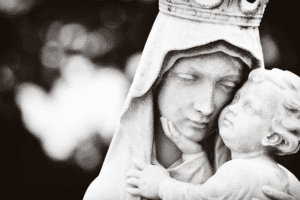 In 2016, I piled into a hot, crowded bus in Krakow, Poland, with my then 16-year-old twins, Luke and Olivia, and our small youth group from St. Patrick’s in Armonk. It was the first day of World Youth Week, and along with millions of others, we had set out to explore the incredible city and its many Catholic treasures.
In 2016, I piled into a hot, crowded bus in Krakow, Poland, with my then 16-year-old twins, Luke and Olivia, and our small youth group from St. Patrick’s in Armonk. It was the first day of World Youth Week, and along with millions of others, we had set out to explore the incredible city and its many Catholic treasures.
As we rode along, our tour group leader instructed us to find our rosaries so we could pray the Chaplet of Divine Mercy. I gave Father Galens (our parish pastor at the time) a confused look. What was this prayer? Simultaneously, the kids shot me curious glances. Luckily, we were fast learners of this simple devotion: “For the sake of His sorrowful Passion, have mercy on us and the whole world.”
But where did the prayer come from, and what exactly did it mean?
By the end of the week, I had “met” the great Saint, Faustina Kowalska (1905-1938), also known as the “Secretary of Divine Mercy,” and was introduced to her epic mission of spreading God’s loving message of Divine Mercy—which is especially meaningful during Lent.
God loves each one of us more than we can humanly understand—and because of His perfect love, no sin is too big for His mercy if only we turn to Him in trust and repentance. As John 3:16 says, For God so loved the world that he gave his one and only Son, that whoever believes in him shall not perish but have eternal life.
As I learned on our pilgrimage, The Lord made it known to St. Faustina that the Chaplet of Divine Mercy, taught to her by the Holy Trinity, was not just for her but also the whole world. It is a mighty intercessory prayer because we make it in union with the offering up of Christ’s own Body and Blood, Soul, and Divinity at every Eucharist—and the Mass is the most powerful prayer on earth! Therefore, we can use the Chaplet to open up the floodgates of God’s mercy—so He can pour out His merciful love upon the world through His Son. And we can even get specific when we pray. We can ask for his merciful love over our children, friends, and family who have strayed, those who have died, the sick, the poor, the souls in purgatory, our priests, our politicians, the Pope, and even our enemies. So, using each bead of the rosary, we say: For the sake of His sorrowful Passion, have mercy on ___________ and the whole world, and we allow that ocean of mercy to pour out. How amazing!
It only takes about 7 minutes to pray the entire Chaplet! Consider saying it at 3 PM each day during the Lenten season to recall the hour of Christ’s death on the cross. Excerpts of Jesus speaking to St. Faustina in her Diary give great encouragement for making this devotional prayer a habit. “Say unceasingly the Chaplet that I have taught you. Whoever will recite it will receive great mercy at the hour of death. Even if there were a sinner most hardened, if he were to recite this Chaplet only once, he would receive grace from My infinite mercy. I desire that the whole world know My infinite mercy. I desire to grant unimaginable graces to those souls who trust in My mercy.” (Diary, 687) “Through the Chaplet, you will obtain everything, if what you ask for is compatible with My will.” (Dairy, 1731)
I was newly inspired to take up this prayer by a talk I heard given by Father Chris Alar, MIC, in which he said God existed outside of space and time. Therefore, a prayer we say today can help to save a soul who perished ten, twenty, even hundreds of years ago—because God knew in advance that you or I would one day intercede for that soul with our plea for mercy. Incredible!
Today, we have so much to pray about! Consider using the gift God has given to us for these troubled times. This Lent, let’s pray the Chaplet for each other, our families, our country. Let’s ask for mercy for the “good thief” hanging on a cross to the right of Jesus and the “other thief” hanging on a cross to the left of Jesus—for each man represents a piece of our very own broken hearts. May our love and repentance pierce open the heart of Jesus in mercy and forgiveness for ourselves and the whole world.
“One of the criminals who was hanged railed at him, saying, ‘Are you not the Christ? Save yourself and us!’ But the other rebuked him, saying, ‘Do you not fear God, since you are under the same sentence of condemnation? And we indeed justly; for we are receiving the due reward of our deeds, but this man has done nothing wrong.’ And he said, ‘Jesus, remember me when you come into your kingdom.’ And Jesus said to him, ‘Truly, I say to you, today you will be with me in Paradise” (Luke 23 39:43).
O human souls, where are you going to hide on the day of God’s anger? Take refuge now in the fount of God’s mercy. O, what a great multitude of souls I see! They worshiped the Divine Mercy and will be singing the hymn of praise for all eternity.” (Diary, 848)



